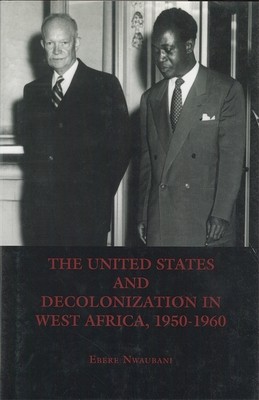
- We will send in 10–14 business days.
- Author: Ebere Nwaubani
- Publisher: University of Rochester Press
- ISBN-10: 1580460763
- ISBN-13: 9781580460767
- Format: 15.2 x 22.9 x 2.4 cm, kieti viršeliai
- Language: English
- SAVE -10% with code: EXTRA
The United States and Decolonization in West Africa, 1950-1960 (e-book) (used book) | bookbook.eu
Reviews
Description
A history of America's tangled involvement in the transition of British and French West African territories to statehood.
As an investigation of America's response to the decolonization process in West Africa, The United States and Decolonization in West Africa, 1950-60 fills several important gaps. The history of America's involvement in Africa remains understudied. This book focuses on a neglected decade when the "wind of change" swept across Africa. Critical of the traditional "nationalist" interpretation of the decolonization process in Africa, the author begins his book by placing the transition of British and French West African territories to statehood with a neocolonialist framework. In doing so, he abandons the conventional definitions and usages of "independence" and "decolonization", and makes a compelling case that these are two related but different phenomena. Nwaubani argues that the United States was not a catalyst in the transition process in West Africa, but rather acted in a neocolonialist fashion itself. He also gives a nuanced appraisal of the Cold War, demonstrating that it was not as important as popularly believed in determining US behavior in Africa.The primary focus of the book is on West Africa, with case studiesfocusing on the Ewe, Ghana [including the Volta dam project], and Guinea. But the broad issues discussed are framed in the larger context of sub-Saharan Africa, and against the backdrop of the larger debates about the nature of post-1945 United States diplomacy. Ebere Nwaubani is a member of the History Department, University of Colorado at Boulder.
EXTRA 10 % discount with code: EXTRA
The promotion ends in 23d.12:08:51
The discount code is valid when purchasing from 10 €. Discounts do not stack.
- Author: Ebere Nwaubani
- Publisher: University of Rochester Press
- ISBN-10: 1580460763
- ISBN-13: 9781580460767
- Format: 15.2 x 22.9 x 2.4 cm, kieti viršeliai
- Language: English English
A history of America's tangled involvement in the transition of British and French West African territories to statehood.
As an investigation of America's response to the decolonization process in West Africa, The United States and Decolonization in West Africa, 1950-60 fills several important gaps. The history of America's involvement in Africa remains understudied. This book focuses on a neglected decade when the "wind of change" swept across Africa. Critical of the traditional "nationalist" interpretation of the decolonization process in Africa, the author begins his book by placing the transition of British and French West African territories to statehood with a neocolonialist framework. In doing so, he abandons the conventional definitions and usages of "independence" and "decolonization", and makes a compelling case that these are two related but different phenomena. Nwaubani argues that the United States was not a catalyst in the transition process in West Africa, but rather acted in a neocolonialist fashion itself. He also gives a nuanced appraisal of the Cold War, demonstrating that it was not as important as popularly believed in determining US behavior in Africa.The primary focus of the book is on West Africa, with case studiesfocusing on the Ewe, Ghana [including the Volta dam project], and Guinea. But the broad issues discussed are framed in the larger context of sub-Saharan Africa, and against the backdrop of the larger debates about the nature of post-1945 United States diplomacy. Ebere Nwaubani is a member of the History Department, University of Colorado at Boulder.


Reviews